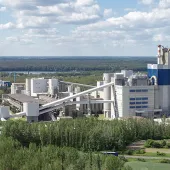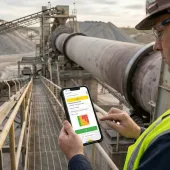Climate change and occupational risks
How can employers respond? Veriforce CHAS outline some key risks and mitigation strategies
AHEAD of World Day for Safety and Health at Work (28 April 2024), which will focus on the impact of climate change on occupational safety and health, Alex Minett, head of global new markets at Veriforce CHAS, outlines some key climate change-related risks and mitigation strategies for employers.
'Climate change is no longer a distant threat but a present reality with significant impacts on occupational health and safety. As its effects intensify, employers must recognize and address the exacerbated risks their workers face. From heat stress to increased exposure to air pollution, it helps to be vigilant and proactive in addressing climate change-associated risks.'
Heat stress
'Rising temperatures due to climate change present a significant occupational hazard for outdoor workers, heightening the risk of heat-related illnesses such as heat exhaustion and heatstroke. Prolonged exposure to high temperatures can lead to dehydration, heat cramps, and, in severe cases, heat-related fatalities.
'To address this challenge, employers can implement various mitigation strategies. Providing access to shaded areas or designated rest breaks in cool environments allows workers to seek refuge from the sun’s intense heat, reducing the risk of overheating. Ensuring ample availability of drinking water is crucial for maintaining hydration levels and preventing dehydration.
'Additionally, scheduling strenuous tasks during cooler parts of the day, such as early morning or late afternoon, helps minimize exposure to extreme heat. Furthermore, offering comprehensive training sessions to workers on how to recognize early signs of heat-related illnesses and respond effectively can empower them to take proactive measures to protect their health and well-being.'
UV radiation
'The depletion of the ozone layer has intensified workers’ exposure to harmful ultraviolet (UV) radiation, particularly for those who work outdoors. UV radiation poses serious health risks, including sunburn, premature skin ageing, and an increased likelihood of developing skin cancer.
'To mitigate these risks, employers can implement various protective measures. Providing appropriate protective clothing, such as long-sleeved shirts and wide-brimmed hats, helps shield workers from direct sun exposure. Equipping workers with UV-blocking sunglasses and broad-spectrum sunscreen further protects them against harmful UV rays. Encouraging regular breaks in shaded areas allows workers to seek relief from direct sunlight and reduce prolonged exposure to UV radiation. Moreover, scheduling outdoor tasks during less-intense UV radiation hours, typically early morning or late afternoon, helps minimize the risk of sunburn and other UV-related health issues.'
Air pollution
'Climate change exacerbates air pollution, particularly in industries with high levels of pollutant emissions, posing significant risks to respiratory health. Exposure to air pollutants such as particulate matter, ozone, and nitrogen dioxide can exacerbate respiratory conditions such as asthma and chronic obstructive pulmonary disease (COPD), as well as increase the risk of cardiovascular diseases.
'To mitigate these health hazards, employers can implement various strategies. Reducing emissions within the workplace through the adoption of cleaner technologies and processes helps improve indoor air quality and protect workers’ health. Providing respiratory protection equipment, such as masks or respirators and ensuring they are appropriately fitted offers additional protection against inhaling harmful pollutants during work activities. Additionally, upgrading equipment or processes to minimize emissions helps mitigate the impact of industrial activities on air quality and public health.'
Major industrial accidents
'Extreme weather events linked to climate change, such as hurricanes, floods, and severe storms, pose an increased risk of major industrial accidents, endangering workers and surrounding communities. These events can lead to infrastructure damage, chemical spills, fires, and other hazardous situations, resulting in injuries, fatalities, and environmental damage.
'To mitigate these risks, employers must implement comprehensive risk-management measures. Conducting thorough risk assessments helps identify potential hazards and vulnerabilities, enabling proactive measures to prevent accidents and minimize their impact. Establishing comprehensive emergency preparedness plans ensures that workers and communities are equipped to respond effectively to industrial accidents, with clear protocols for evacuation, emergency communication, and response coordination. Ensuring resilient infrastructure and equipment that can withstand extreme weather conditions reduces the likelihood of failures and accidents during severe weather events. Regular training on emergency procedures and protocols empowers workers to respond quickly and effectively in the event of an industrial accident, enhancing overall safety and preparedness.'

Conclusion
'Climate change poses significant challenges to occupational health and safety, calling for proactive measures from employers to protect their workers. Integrating climate concerns into occupational safety and health practices can create safer working environments in the face of a rapidly changing climate.'
To mark World Day for Safety and Health at Work, the International Labour Organisation will host a webinar on 25 April 2024. The webinar, which will feature experts discussing worker protection and response strategies, will be live-streamed on https://live.ilo.org/ from 13:30–15:00 CET, and can be joined directly with no need to register.










